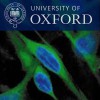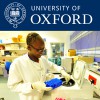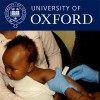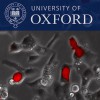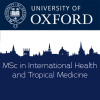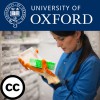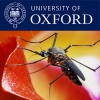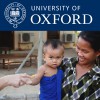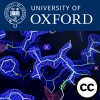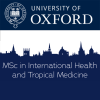Nuffield Department of Clinical Medicine
Relevant Links
The Nuffield Department of Medicine (NDM) is a large multi-disciplinary Department that links high quality basic biological science with medical application. Led by Professor Peter Ratcliffe FRS, who is both an active researcher in cell biology and an active clinician, the Department employs in the region of 1000 scientific research staff working in a range of basic science and clinical disciplines. Our researchers contribute to the teaching of 450 medical students within Oxford University's Clinical School.
Our base at the Headington Hospitals campus, Oxford, is now one of the largest centres for biomedical research in Europe with over £200M invested in capital projects and research infrastructure over the last decade. The rapidly growing campus provides a vibrant, highly interactive environment for research development. We are particularly committed to the career development of young scientists, including those from basic science as well as clinical backgrounds. In 2006 the Oxford University / Oxford Radcliffe Hospital Trust partnership successfully competed to be one of five UK Biomedical Research Centres. We played a leading role in this initiative, which provides a range of new opportunities for basic scientists to interact with clinical medical research, and for career development of clinician scientists.
In addition to its Oxford base, the Department operates a number of major overseas programmes in tropical medicine and global health, with research units in Thailand, Laos, Vietnam and Kenya supporting activities at numerous sites in S-E Asia and Sub-Saharan Africa. We also operate extensive epidemiological and clinical trials networks throughout China, India and South America.
In Oxford, NDM maintains research platforms across structural biology, protein biochemistry, genetics, genomics, proteomics, cell biology, chemical and genetic screening, imaging, bioinformatics, medical statistics, epidemiology, and clinical trials. Thematic research includes cancer biology, immunology, vaccinology, infectious diseases, gastroenterology, dermatology, diabetes and metabolic medicine, renal medicine, respiratory medicine, stroke medicine, and geratology.
Series associated with Nuffield Department of Clinical Medicine
| # | Episode Title | Description | People | Date | |
|---|---|---|---|---|---|
| 402 | Creative Commons | Molecular diagnosis and bacterial genotyping | Dr Janjira Thaipadungpanit from our MORU unit in Bangkok, Thailand, tells us about her research on molecular diagnosis and bacterial genotyping | Janjira Thaipadungpanit | 12 Apr 2017 |
| 401 | Creative Commons | Biomarkers for tropical diseases | Dr Markus Winterbert from our MORU unit in Bangkok, Thailand, tells us about his research on biomarkers for tropical diseases | Markus Winterberg | 12 Apr 2017 |
| 400 | Creative Commons | Biomarkers for tropical diseases | Dr Markus Winterbert from our MORU unit in Bangkok, Thailand, tells us about his research on biomarkers for tropical diseases | Markus Winterberg | 12 Apr 2017 |
| 399 | Creative Commons | MORU Biosafety Level 3 and melioidosis in Thailand | Premjit Amornchai from our MORU unit in Bangkok, Thailand, tells us about her work as biosafety level 3 lab manager and microbioogy safety officer | Premjit Amornchai | 12 Apr 2017 |
| 398 | Creative Commons | MORU Biosafety Level 3 and melioidosis in Thailand | Premjit Amornchai from our MORU unit in Bangkok, Thailand, tells us about her work as biosafety level 3 lab manager and microbioogy safety officer | Premjit Amornchai | 12 Apr 2017 |
| 397 | Creative Commons | Malaria control in Africa | Professor Bob Snow from our KEMRI-Wellcome programme in Nairobi, Kenya, tells us how his research brings together epidemiological profiles and government policies to maximise malaria control programmes in Africa | Bob Snow | 12 Apr 2017 |
| 396 | Creative Commons | Malaria control in Africa | Professor Bob Snow from our KEMRI-Wellcome programme in Nairobi, Kenya, tells us how his research brings together epidemiological profiles and government policies to maximise malaria control programmes in Africa | Bob Snow | 12 Apr 2017 |
| 395 | Creative Commons | Malaria elimination in the Greater Mekong sub-region | Dr Lorenz von Seidlein from our MORU unit in Bangkok, Thailand, tells us about his research on malaria elimination in the Greater Mekong sub-region | Lorenz von Seidlein | 12 Apr 2017 |
| 394 | Creative Commons | Malaria elimination in the Greater Mekong sub-region | Dr Lorenz von Seidlein from our MORU unit in Bangkok, Thailand, tells us about his research on malaria elimination in the Greater Mekong sub-region | Lorenz von Seidlein | 12 Apr 2017 |
| 393 | Creative Commons | Mapping bacterial antibiotic resistance | Dr Olga Tosas-Auguet from our unit in Kenya tells us about her research on mapping bacterial antibiotic resistance | Olga Tosas-Auguet | 17 Feb 2017 |
| 392 | Creative Commons | Tracking infections | Professor Derrick Crook from our Experimental Medicine division tells us about his research on tracking infections | Derek Crook | 10 Feb 2017 |
| 391 | Creative Commons | Bacterial infections in Laos | David Dance from our LOMWRU unit in Laos tells us about his research on bacterial infections in Laos, particularly melioidosis | David Dance | 10 Feb 2017 |
| 390 | Creative Commons | Tracking infections | Professor Derrick Crook from our Experimental Medicine division tells us about his research on tracking infections | Derrick Crook | 08 Feb 2017 |
| 389 | Creative Commons | Mapping bacterial antibiotic resistance | Dr Olga Tosas-Auguet from our unit in Kenya tells us about her research on mapping bacterial antibiotic resistance | Olga Tosas-Auguet | 08 Feb 2017 |
| 388 | Creative Commons | Bacterial infections in Laos | David Dance from our LOMWRU unit in Laos tells us about his research on bacterial infections in Laos, particularly melioidosis | David Dance | 08 Feb 2017 |
| 387 | Creative Commons | Optimising malaria treatment | Dr Georgina Humphreys coordinates the WorldWide Antimalarial Resistance Network (WWARN) study groups by encouraging partner engagement and managing the data curation and development of publications. | Georgina Humphreys | 14 Dec 2016 |
| 386 | Creative Commons | Outbreak, the clinical research response | Dr Gail Carson is Head of ISARIC Coordinating Centre (International Severe Acute Respiratory and Emerging Infection Consortium), a network of networks established in 2011 to ensure a rapid research response to outbreaks of pandemic potential. | Gail Carson | 14 Dec 2016 |
| 385 | Creative Commons | Epigenetic modifications and cancer | Professor Skirmantas Kriaucionis aims to to elucidate the molecular function of DNA modifications in normal cells and cancer. | Skirmantas Kriaucionis | 14 Dec 2016 |
| 384 | Creative Commons | Fighting malaria in Myanmar | Professor Frank Smithuis is the director of MOCRU, Myanmar Oxford Clinical Research Unit. MOCRU involves a network of 6 clinics and 650 community health workers in remote areas. | Frank Smithuis | 14 Dec 2016 |
| 383 | Creative Commons | Optimising malaria treatment | Dr Georgina Humphreys coordinates the WorldWide Antimalarial Resistance Network (WWARN) study groups by encouraging partner engagement and managing the data curation and development of publications. | Georgina Humphreys | 14 Dec 2016 |
| 382 | Creative Commons | Outbreak, the clinical research response | Dr Gail Carson is Head of ISARIC Coordinating Centre (International Severe Acute Respiratory and Emerging Infection Consortium), a network of networks established in 2011 to ensure a rapid research response to outbreaks of pandemic potential. | Gail Carson | 14 Dec 2016 |
| 381 | Creative Commons | Epigenetic modifications and cancer | Professor Skirmantas Kriaucionis aims to to elucidate the molecular function of DNA modifications in normal cells and cancer. | Skirmantas Kriaucionis | 14 Dec 2016 |
| 380 | Creative Commons | Fighting malaria in Myanmar | Professor Frank Smithuis is the director of MOCRU, Myanmar Oxford Clinical Research Unit. MOCRU involves a network of 6 clinics and 650 community health workers in remote areas. | Frank Smithuis | 14 Dec 2016 |
| 379 | Why we work on Alzheimer’s disease | Housed within the Target Discovery Institute, the Alzheimer’s Research UK Oxford Drug Discovery Institute (ODDI) juxtaposes drug discovery expertise alongside scientific and academic understanding of patients, disease mechanisms and model systems. | John Davis | 30 Nov 2016 | |
| 378 | Creative Commons | Gastrointestinal cancers | Dr Claire Palles studies whole genome sequencing data and targeted analyses with the aim of discovering genetic variants that affect susceptibility to colorectal cancer and Barrett’s oesophagus. | Claire Palles | 30 Nov 2016 |
| 377 | Creative Commons | Poor quality medicines | LOMWRU researchers conduct clinical research to help improve global, regional and Lao public health. They focus on infectious diseases, and also investigate diseases of nutrition and poverty. | Paul Newton | 30 Nov 2016 |
| 376 | Creative Commons | Why we work on Alzheimer’s disease | Housed within the Target Discovery Institute, the Alzheimer’s Research UK Oxford Drug Discovery Institute (ODDI) juxtaposes drug discovery expertise alongside scientific and academic understanding of patients, disease mechanisms and model systems. | John Davis | 30 Nov 2016 |
| 375 | Creative Commons | Gastrointestinal cancers | Dr Claire Palles studies whole genome sequencing data and targeted analyses with the aim of discovering genetic variants that affect susceptibility to colorectal cancer and Barrett’s oesophagus. | Claire Palles | 30 Nov 2016 |
| 374 | Creative Commons | Poor quality medicines | LOMWRU researchers conduct clinical research to help improve global, regional and Lao public health. They focus on infectious diseases, and also investigate diseases of nutrition and poverty. | Paul Newton | 30 Nov 2016 |
| 373 | Creative Commons | High altitude illness | Director of OUCRU-Nepal, Dr Buddha Basnyat studies high altitude illness as well as undifferentiated febrile illness in the tropics, both common but neglected problems in Nepal. | Buddha Basnyat | 02 Nov 2016 |
| 372 | Creative Commons | High altitude illness | Director of OUCRU-Nepal, Dr Buddha Basnyat studies high altitude illness as well as undifferentiated febrile illness in the tropics, both common but neglected problems in Nepal. | Buddha Basnyat | 02 Nov 2016 |
| 371 | Creative Commons | Infectious diseases in Indonesia | Professor Kevin Baird leads our Eijkman-Oxford Clinical Research Unit (EOCRU) in Jakarta, Indonesia. | Kevin Baird | 02 Nov 2016 |
| 370 | Creative Commons | Finding the best malaria treatments | Dr Mehul Dhorda heads the Asia Regional Centre of the WorldWide Antimalarial Resistance Network (WWARN). | Mehul Dhorda | 02 Nov 2016 |
| 369 | Creative Commons | Evolution and pathogenicity of viruses | Professor Peter Simmonds studies the epidemiology, evolution and emergence of a wide range of human pathogenic viruses. | Peter Simmonds | 02 Nov 2016 |
| 368 | Creative Commons | Infectious diseases in Indonesia | Professor Kevin Baird leads our Eijkman-Oxford Clinical Research Unit (EOCRU) in Jakarta, Indonesia. | Kevin Baird | 02 Nov 2016 |
| 367 | Creative Commons | Finding the best malaria treatments | Dr Mehul Dhorda heads the Asia Regional Centre of the WorldWide Antimalarial Resistance Network (WWARN). | Mehul Dhorda | 02 Nov 2016 |
| 366 | Creative Commons | Evolution and pathogenicity of viruses | Professor Peter Simmonds studies the epidemiology, evolution and emergence of a wide range of human pathogenic viruses. | Peter Simmonds | 02 Nov 2016 |
| 365 | Creative Commons | Introducing Mesh: The Global Health Network's Community Engagement Webspace | This webinar features introductions from Francois Van Loggerenberg, scientific lead at the Global Health Network, and community engagement consultant Georgia Bladon to the community engagement platform Mesh. | Francois van Loggerenberg, Georgia Blazon | 31 Oct 2016 |
| 364 | Creative Commons | X-rays for drug discovery | Professor Frank von Delft works to ensure that X-ray structures can serve as a routine and predictive tool for generating novel chemistry for targeting proteins. | Frank von Delft | 23 Sep 2016 |
| 363 | Creative Commons | X-rays for drug discovery | Professor Frank von Delft works to ensure that X-ray structures can serve as a routine and predictive tool for generating novel chemistry for targeting proteins. | Frank von Delft | 23 Sep 2016 |
| 362 | Method in the Motion | A unique evening combining a scientific talk with inspirational dance. | Irina Pulyakhina, Flux | 14 Jul 2016 | |
| 361 | Creative Commons | Modelling bacterial drug resistance | Professor Ben Cooper from MORU in Thailand uses mathematical modelling and statistical techniques to help understand the dynamics of infectious disease and evaluate potential control measures. | Ben Cooper | 01 Jul 2016 |
| 360 | Creative Commons | Epidemiology and malaria elimination | Dr Richard Maude's work combines clinical studies, descriptive epidemiology and mathematical modelling of malaria in South and Southeast Asia. | Richard Maude | 01 Jul 2016 |
| 359 | Creative Commons | Modelling bacterial drug resistance | Professor Ben Cooper from MORU in Thailand uses mathematical modelling and statistical techniques to help understand the dynamics of infectious disease and evaluate potential control measures. | Ben Cooper | 01 Jul 2016 |
| 358 | Creative Commons | Epidemiology and malaria elimination | Dr Richard Maude's work combines clinical studies, descriptive epidemiology and mathematical modelling of malaria in South and Southeast Asia. | Richard Maude | 01 Jul 2016 |
| 357 | Creative Commons | Why data management matters | Naomi’s work focuses on supporting researchers to collect, clean and store research data. | Naomi Waithira | 02 Jun 2016 |
| 356 | Creative Commons | Malaria laboratory at MORU | Dr Kesinee Chotivanich's laboratory provides facilities and resources to researchers, students, and collaborators who are interested in tropical diseases, with the aim to improve patients’ care. | Kesinee Chotivanich | 02 Jun 2016 |
| 355 | Creative Commons | From information to structure | Dr Brian Marsden aims to make structural and chemical biology data accessible to non-experts, by providing computational resources including data management, sample tracking, in silico modelling support plus provision of public access to SGC data. | Brian Marsden | 02 Jun 2016 |
| 354 | Creative Commons | Why data management matters | Naomi’s work focuses on supporting researchers to collect, clean and store research data. | Naomi Waithira | 02 Jun 2016 |
| 353 | Creative Commons | Malaria laboratory at MORU | Dr Kesinee Chotivanich's laboratory provides facilities and resources to researchers, students, and collaborators who are interested in tropical diseases, with the aim to improve patients’ care. | Kesinee Chotivanich | 02 Jun 2016 |
| 352 | Creative Commons | From information to structure | Dr Brian Marsden aims to make structural and chemical biology data accessible to non-experts, by providing computational resources including data management, sample tracking, in silico modelling support plus provision of public access to SGC data. | Brian Marsden | 02 Jun 2016 |
| 351 | Creative Commons | Repairing DNA damage | Dr Ross Chapman studies the molecular events triggered by DNA damage detection, and why defects in these events lead to immune deficiency and cancer in humans. | Ross Chapman | 28 Apr 2016 |
| 350 | Creative Commons | Malaria in Kenya | There is a great need for better treatments for malaria and for a preventative malaria vaccine. | Philip Bejon | 28 Apr 2016 |
| 349 | Creative Commons | Microbiology in the tropics | The Cambodia Oxford Medical Research Unit (COMRU) is based in Siem Reap, northern Cambodia, which remains one of the poorest countries in South East Asia with extremely limited health services. | Paul Turner | 28 Apr 2016 |
| 348 | Unravelling proteins | Dr Nicola Burgess-Brown heads the Biotechnology Group at the SGC, which generates proteins suitable for structural and functional studies. | Nicola Burgess-Brown | 28 Apr 2016 | |
| 347 | Targeting drug discovery | The development of new medicines is dependent on the identification of novel drug targets. | Kilian Huber | 28 Apr 2016 | |
| 346 | Creative Commons | Microbiology research in SE Asia | Dr Direk Limmathurotsakul's research focuses on the epidemiology of melioidosis, a bacterial infection caused by Burkholderia pseudomallei. | Direk Limmathurotsakul | 28 Apr 2016 |
| 345 | Creative Commons | Tropical neonatology | Dr Claudia Turner heads the clinical research program at the Cambodia Oxford Medical Research Unit (COMRU), in collaboration with the Angkor Hospital for Children. | Claudia Turner | 28 Apr 2016 |
| 344 | Creative Commons | Global health informatics | Dr Chris Paton studies the use of open-source Electronic Health Records (EHR) software, online learning and mobile technology to improve healthcare delivery in low-resource settings. | Chris Paton | 28 Apr 2016 |
| 343 | Creative Commons | Dengue diagnosis and management | With 390 million infections occuring each year, dengue is the most important mosquito-borne viral infection, and no vaccine is currently available. | Bridget Wills | 28 Apr 2016 |
| 342 | Understanding growth signals | Growth hormones and cytokines regulate the key physiological processes of growth and differentiation as well as responses to injury and infection. | Alex Bullock | 28 Apr 2016 | |
| 341 | Creative Commons | Repairing DNA damage | Dr Ross Chapman studies the molecular events triggered by DNA damage detection, and why defects in these events lead to immune deficiency and cancer in humans. | Ross Chapman | 28 Apr 2016 |
| 340 | Creative Commons | Malaria in Kenya | There is a great need for better treatments for malaria and for a preventative malaria vaccine. | Philip Bejon | 28 Apr 2016 |
| 339 | Creative Commons | Microbiology in the tropics | The Cambodia Oxford Medical Research Unit (COMRU) is based in Siem Reap, northern Cambodia, which remains one of the poorest countries in South East Asia with extremely limited health services. | Paul Turner | 28 Apr 2016 |
| 338 | Creative Commons | Unravelling proteins | Dr Nicola Burgess-Brown heads the Biotechnology Group at the SGC, which generates proteins suitable for structural and functional studies. | Nicola Burgess-Brown | 28 Apr 2016 |
| 337 | Creative Commons | Targeting drug discovery | The development of new medicines is dependent on the identification of novel drug targets. | Kilian Huber | 28 Apr 2016 |
| 336 | X-rays for drug discovery | Dr Frank von Delft works to ensure that X-ray structures can serve as a routine and predictive tool for generating novel chemistry for targeting proteins. | Frank von Delft | 28 Apr 2016 | |
| 335 | Creative Commons | Microbiology research in SE Asia | Dr Direk Limmathurotsakul's research focuses on the epidemiology of melioidosis, a bacterial infection caused by Burkholderia pseudomallei. | Direk Limmathurotsakul | 28 Apr 2016 |
| 334 | Creative Commons | Tropical neonatology | Dr Claudia Turner heads the clinical research program at the Cambodia Oxford Medical Research Unit (COMRU), in collaboration with the Angkor Hospital for Children. | Claudia Turner | 27 Apr 2016 |
| 333 | Creative Commons | Global health informatics | Dr Chris Paton studies the use of open-source Electronic Health Records (EHR) software, online learning and mobile technology to improve healthcare delivery in low-resource settings. | Chris Paton | 27 Apr 2016 |
| 332 | Creative Commons | Dengue diagnosis and management | With 390 million infections occuring each year, dengue is the most important mosquito-borne viral infection, and no vaccine is currently available. | Bridget Wills | 27 Apr 2016 |
| 331 | Creative Commons | Understanding growth signals | Growth hormones and cytokines regulate the key physiological processes of growth and differentiation as well as responses to injury and infection. | Alex Bullock | 27 Apr 2016 |
| 330 | Variation across the human genome: a tricky balancing act in human health and disease | Genetic variation can have opposing effects on human disease, where the benefits of a protective variant against one disease can increase the risk of another. | Mary Carrington | 10 Feb 2016 | |
| 329 | Malaria in pregnancy | In pregnant women, severe malaria is responsible for high maternal mortality, and uncomplicated malaria results in in high morbidity. | Rose McGready | 04 Feb 2016 | |
| 328 | Reducing HIV | Men who have sex with men (MSM) are a stigmatised group in Africa, but a predominant actor in the transmission of HIV. | Eduard Sanders | 04 Feb 2016 | |
| 327 | Creative Commons | Cleaning up misfolded proteins | Misfolded proteins can either create the loss of a cellular function, or escape degradation, causing aggregation diseases. | John Christianson | 04 Feb 2016 |
| 326 | Creative Commons | Rare neurological disorders | Chorea-Acanthocytosis: ChAc is a rare progressive neurological disorder caused by mutations in a very complex gene. | Antonio Velayos-Baeza | 04 Feb 2016 |
| 325 | Creative Commons | Malaria in pregnancy | In pregnant women, severe malaria is responsible for high maternal mortality, and uncomplicated malaria results in in high morbidity. | Rose McGready | 04 Feb 2016 |
| 324 | Creative Commons | Reducing HIV | Men who have sex with men (MSM) are a stigmatised group in Africa, but a predominant actor in the transmission of HIV. | Eduard Sanders | 04 Feb 2016 |
| 323 | Creative Commons | Cleaning up misfolded proteins | Misfolded proteins can either create the loss of a cellular function, or escape degradation, causing aggregation diseases. | John Christianson | 04 Feb 2016 |
| 322 | Creative Commons | Rare neurological disorders | Chorea-Acanthocytosis: ChAc is a rare progressive neurological disorder caused by mutations in a very complex gene. | Antonio Velayos-Baeza | 04 Feb 2016 |
| 321 | Creative Commons | Targeting cancer mechanisms | Professor Robert Gilbert's research focuses on the molecular mechanisms underlying membrane pore formation and cell adhesion. | Robert Gilbert | 07 Jan 2016 |
| 320 | Inflammation in disease | The main aim of Dr Xue's research is to understand the molecular and cellular mechanisms mediating inflammatory diseases, and to translate their findings into therapeutic concepts to treat these diseases. | Luzheng Xue | 07 Jan 2016 | |
| 319 | Creative Commons | Computation and genetics | Resistance to drugs in bacteria can be aquired by swapping genes between individual bacteria. Computer programs developed by Dr Iqbal enable doctors to predict which antibiotics will be met with drug resistance, enabling the selection of the right drug. | Zamin Iqbal | 07 Jan 2016 |
| 318 | Creative Commons | Targeting cancer mechanisms | Professor Robert Gilbert's research focuses on the molecular mechanisms underlying membrane pore formation and cell adhesion. | Robert Gilbert | 07 Jan 2016 |
| 317 | Creative Commons | Inflammation in disease | The main aim of Dr Xue's research is to understand the molecular and cellular mechanisms mediating inflammatory diseases, and to translate their findings into therapeutic concepts to treat these diseases. | Luzheng Xue | 07 Jan 2016 |
| 316 | Creative Commons | Computation and genetics | Resistance to drugs in bacteria can be aquired by swapping genes between individual bacteria. Computer programs developed by Dr Iqbal enable doctors to predict which antibiotics will be met with drug resistance, enabling the selection of the right drug. | Zamin Iqbal | 07 Jan 2016 |
| 315 | NDM Studentships | Every year, about 60 DPhil students start a life changing experience in the Nuffield Department of Medicine at the University of Oxford. | Robert Gilbert, Steinar Halldorsson, Sophie Andrews | 02 Dec 2015 | |
| 314 | Creative Commons | The Evolution of the Genome | Computational and stastistical methods help us understand evolution as well as genetic disease. | Gerton Lunter | 02 Dec 2015 |
| 313 | Tropical Immunology | Melioidosis is a neglected tropical disease, and a major infectious killer in South East Asia. Melioidosis particularly affects people with diabetes. | Susanna Dunachie | 02 Dec 2015 | |
| 312 | Sharing data to fight malaria | Over 250 Institutions participate in the effort of sharing data on the efficacy of antimalarial drugs, which involves standardising and re-analysing data. | Philippe Guérin | 02 Dec 2015 | |
| 311 | Creative Commons | The Evolution of the Genome | Computational and stastistical methods help us understand evolution as well as genetic disease. | Gerton Lunter | 02 Dec 2015 |
| 310 | Creative Commons | Tropical Immunology | Melioidosis is a neglected tropical disease, and a major infectious killer in South East Asia. Melioidosis particularly affects people with diabetes. | Susanna Dunachie | 02 Dec 2015 |
| 309 | Creative Commons | Sharing data to fight malaria | Over 250 Institutions participate in the effort of sharing data on the efficacy of antimalarial drugs, which involves standardising and re-analysing data. | Philippe Guérin | 02 Dec 2015 |
| 308 | Science in a crisis, fast-forwarding clinical research for Ebola | Professor Peter Horby's research focuses on epidemic diseases such as Ebola and bird flu, and crosses the disciplines of basic science, medical science and public health. | Peter Horby | 02 Dec 2015 | |
| 307 | Steinar Halldorsson | Every year, about 60 DPhil students start a life changing experience in the Nuffield Department of Medicine in Oxford. | Steinar Halldorsson | 02 Dec 2015 | |
| 306 | Sophie Andrews | Every year, about 60 DPhil students start a life changing experience in the Nuffield Department of Medicine in Oxford. | Sophie Andrews | 02 Dec 2015 | |
| 305 | Creative Commons | The Heart and the Head, Part 5 | Daniel Bulte, from the Department of Oncology, speaks about what happens when they discover an ‘incidental finding’. | Daniel Bulte | 16 Nov 2015 |
| 304 | Creative Commons | The Heart and the Head, Part 4 | Portia Westall, from the Donnelly group at the WTCHG, speaks about how she thinks about music when working on DNA sequences. | Portia Westall | 16 Nov 2015 |
| 303 | Creative Commons | The Heart and the Head, Part 3 | Erwan Atcheson, from the Jenner Institute, speaks about his time studying parasitic worms, and the worries that come with it. | Erwan Atcheson | 16 Nov 2015 |
- ‹ previous
- 2 of 6
- next ›



